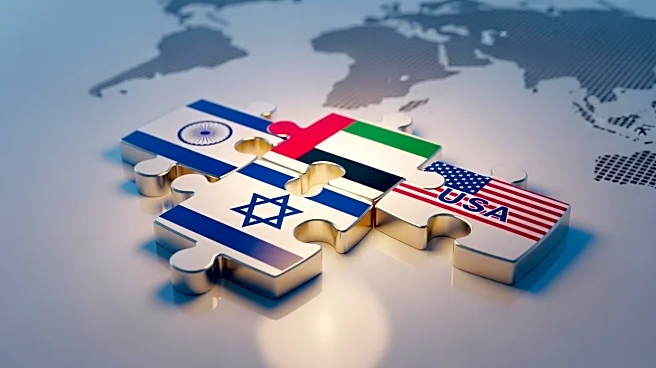What's Happening?
The I2U2 is a strategic partnership formed between India, Israel, the United Arab Emirates (UAE), and the United States, officially launched in July 2022. This initiative focuses on economic cooperation
and infrastructure projects, aiming to tackle global challenges through joint investments in sectors such as water, energy, transportation, space, health, and food security. The grouping emerged from the Abraham Accords, which normalized relations between Israel and several Arab states, facilitating unprecedented cooperation between Israel and the UAE. The I2U2 aims to mobilize private sector capital and expertise to modernize infrastructure and promote low carbon development pathways.
Why It's Important?
The I2U2 represents a significant shift in international relations, emphasizing economic collaboration over political and security concerns. For India, it offers a platform to enhance its strategic engagement with West Asia, leveraging its robust bilateral relationships with the other member countries. The UAE views the grouping as a means to address its food and water security challenges, while Israel sees it as an extension of the Abraham Accords, providing a platform for economic and strategic partnerships. For the US, the I2U2 helps counter China's expanding influence in the region by fostering closer ties with its allies.
What's Next?
The I2U2 countries plan to focus on key projects, including a food corridor project in India and a hybrid renewable energy project in Gujarat. These initiatives aim to address food security and clean energy needs, with significant investments from the UAE and technological support from Israel and the US. The grouping also intends to establish a business forum to accelerate joint ventures in core economic and technological sectors. However, potential challenges include differing security interests among member countries and the need to maintain a balance in their relations with other regional powers like Iran and China.
Beyond the Headlines
The I2U2's focus on economic cooperation highlights a broader trend towards minilateralism, where smaller, flexible groupings of countries collaborate on specific issues. This approach allows member countries to build trust and overcome political differences, fostering a more pragmatic and goal-oriented form of international cooperation. The initiative also underscores the growing importance of geoeconomics in shaping global partnerships, as countries seek to advance their economic interests in an increasingly interconnected world.










